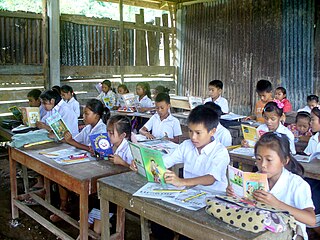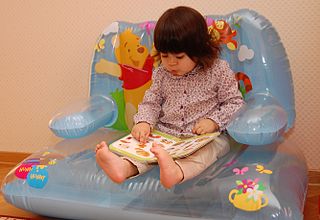 W
WBabbling is a stage in child development and a state in language acquisition during which an infant appears to be experimenting with uttering articulate sounds, but does not yet produce any recognizable words. Babbling begins shortly after birth and progresses through several stages as the infant's repertoire of sounds expands and vocalizations become more speech-like. Infants typically begin to produce recognizable words when they are around 12 months of age, though babbling may continue for some time afterward.
 W
WBilingualism is the regular use of two fluent languages, and bilinguals are those individuals who need and use two languages in their everyday lives. A person's bilingual memories are heavily dependent on the person's fluency, the age the second language was acquired, and high language proficiency to both languages. High proficiency provides mental flexibility across all domains of thought and forces them to adopt strategies that accelerate cognitive development. People who are bilingual integrate and organize the information of two languages, which creates advantages in terms of many cognitive abilities, such as intelligence, creativity, analogical reasoning, classification skills, problem solving, learning strategies, and thinking flexibility.
 W
WCarol Doris Chomsky was an American linguist and education specialist who studied language acquisition in children.
 W
WExtensive reading, free reading, book flood, or reading for pleasure is a way of language learning, including foreign language learning, through large amounts of reading. As well as facilitating acquisition of vocabulary, it is believed to increase motivation through positive affective benefits. It is believed that extensive reading is an important factor in education. Proponents such as Stephen Krashen (1989) claim that reading alone will increase encounters with unknown words, bringing learning opportunities by inferencing. The learner's encounters with unknown words in specific contexts will allow the learner to infer and thus learn those words' meanings. While the mechanism is commonly accepted as true, its importance in language learning is disputed.
 W
WA feral child is a human child who has lived isolated from human contact from a very young age, and so has had little or no experience of human care, behavior, or human language. There are several confirmed cases and other speculative ones. Feral children may have experienced severe abuse or trauma before being abandoned or running away. They are sometimes the subjects of folklore and legends, typically portrayed as having been raised by animals.
 W
WA first language, native tongue, native language, or mother/father/parent tongue, is a language that a person has been exposed to from birth or within the critical period. In some countries, the term native language or mother tongue refers to the language of one's ethnic group rather than one's first language.
 W
WGenie is the pseudonym of an American feral child who was a victim of severe abuse, neglect, and social isolation. Her circumstances are prominently recorded in the annals of linguistics and abnormal child psychology. When she was approximately 20 months old, her father began keeping her in a locked room. During this period, he almost always strapped her into a child's toilet or bound her in a crib with her arms and legs immobilized, forbade anyone from interacting with her, provided her with almost no stimulation of any kind, and left her severely malnourished. The extent of her isolation prevented her from being exposed to any significant amount of speech, and as a result she did not acquire language during her childhood. Her abuse came to the attention of Los Angeles child welfare authorities in November 1970, when she was 13 years and 7 months old.
 W
WJean Berko Gleason is a psycholinguist and professor emerita in the Department of Psychological and Brain Sciences at Boston University who has made fundamental contributions to the understanding of language acquisition in children, aphasia, gender differences in language development, and parent–child interactions.
 W
WExtensive reading, free reading, book flood, or reading for pleasure is a way of language learning, including foreign language learning, through large amounts of reading. As well as facilitating acquisition of vocabulary, it is believed to increase motivation through positive affective benefits. It is believed that extensive reading is an important factor in education. Proponents such as Stephen Krashen (1989) claim that reading alone will increase encounters with unknown words, bringing learning opportunities by inferencing. The learner's encounters with unknown words in specific contexts will allow the learner to infer and thus learn those words' meanings. While the mechanism is commonly accepted as true, its importance in language learning is disputed.
 W
WJoint attention or shared attention is the shared focus of two individuals on an object. It is achieved when one individual alerts another to an object by means of eye-gazing, pointing or other verbal or non-verbal indications. An individual gazes at another individual, points to an object and then returns their gaze to the individual. Scaife and Bruner were the first researchers to present a cross-sectional description of children's ability to follow eye gaze in 1975. They found that most eight- to ten-month-old children followed a line of regard, and that all 11- to 14-month-old children did so. This early research showed it was possible for an adult to bring certain objects in the environment to an infant's attention using eye gaze.
 W
WLanguage processing refers to the way humans use words to communicate ideas and feelings, and how such communications are processed and understood. Language processing is considered to be a uniquely human ability that is not produced with the same grammatical understanding or systematicity in even human's closest primate relatives.
 W
WMultilingualism is the use of more than one language, either by an individual speaker or by a group of speakers. It is believed that multilingual speakers outnumber monolingual speakers in the world's population. More than half of all Europeans claim to speak at least one language other than their mother tongue; but many read and write in one language. Always useful to traders, multilingualism is advantageous for people wanting to participate in globalization and cultural openness. Owing to the ease of access to information facilitated by the Internet, individuals' exposure to multiple languages is becoming increasingly possible. People who speak several languages are also called polyglots.
 W
WA parallel text is a text placed alongside its translation or translations. Parallel text alignment is the identification of the corresponding sentences in both halves of the parallel text. The Loeb Classical Library and the Clay Sanskrit Library are two examples of dual-language series of texts. Reference Bibles may contain the original languages and a translation, or several translations by themselves, for ease of comparison and study; Origen's Hexapla placed six versions of the Old Testament side by side. A famous example is the Rosetta Stone, whose discovery allowed the Ancient Egyptian language to begin being deciphered.
 W
WPimsleur Language Programs is an American language learning company that develops and publishes courses based on the Pimsleur method. It is a division of Simon & Schuster, a publishing company which is a subsidiary of ViacomCBS.
 W
WSpeech repetition is when one individual speaks the sounds they've heard another person pronounce or say. In other words, it is the saying by one individual of the spoken vocalizations made by another individual. Speech repetition requires the person repeating the utterance to have the ability to map the sounds they hear from the other person's oral pronunciation to similar places and manners of articulation in their own vocal tract.
 W
WUniversal grammar (UG), in modern linguistics, is the theory of the genetic component of the language faculty, usually credited to Noam Chomsky. The basic postulate of UG is that a certain set of structural rules are innate to humans, independent of sensory experience. With more linguistic stimuli received in the course of psychological development, children then adopt specific syntactic rules that conform to UG. It is sometimes known as "mental grammar", and stands contrasted with other "grammars", e.g. prescriptive, descriptive and pedagogical. The advocates of this theory emphasize and partially rely on the poverty of the stimulus (POS) argument and the existence of some universal properties of natural human languages. However, the latter has not been firmly established, as some linguists have argued languages are so diverse that such universality is rare. It is a matter of empirical investigation to determine precisely what properties are universal and what linguistic capacities are innate.
 W
WVocabulary development is a process by which people acquire words. Babbling shifts towards meaningful speech as infants grow and produce their first words around the age of one year. In early word learning, infants build their vocabulary slowly. By the age of 18 months, infants can typically produce about 50 words and begin to make word combinations.